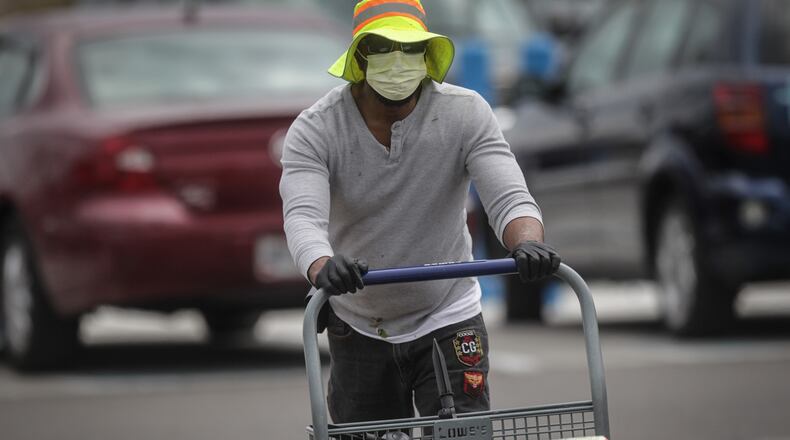MORE CORONAVIRUS: Butler County company shifts direction to donate, sell hand sanitizer
There’s another concern for black men, said Rodney Coates, director of the black world studies program at Miami University. Because of the health risks associated with the coronavirus, black men also will be “more scrutinized” if they choose not to wear a mask in public.
“Damned if you do and damned if you don’t,” he said.
The possibility of being racially profiled while wearing a mask should not discourage anyone from protecting themselves against COVID-19, said Michael Bailey, pastor of Faith Church in Middletown.
“I’m more fearful of the virus,” Bailey, who is black, said when asked about racial profiling. “But I get where people are coming from. We are not on a level playing field.”
Bailey said he and his wife took a walk Wednesday while wearing their masks. He said they walked to a bank and tried to use the drive-through, but were told to come to the front door because of safety concerns. They were not allowed inside the bank, but a teller assisted them, he said.
He never has been apprehensive about wearing his mask, Bailey said.
The COVID-19 has killed more than 55,000 people in the United States, and blacks are disproportionately affected, according to the CDC. Among states with more than 100 coronavirus-related deaths, the mortality rate for blacks is nearly 19 percent, although they make up 13 percent of the population, according to the latest CDC data.
In Ohio, about a quarter of the state’s COVID-19-related deaths are black Americans, although they make up 14 percent of the population. In comparison, 50 percent of whites who are infected with the virus have died as of Monday afternoon, according to the Ohio Department of Health. As of Wednesday, there were 856 COVID-19-related deaths, with an additional 81 probable deaths.
MORE CORONAVIRUS: Coronavirus: Virtual graduations preferred, drive-in ceremonies OK, DeWine says
The disparities in the death rate can be attributed to several underlying factors that have historically plagued the black community, said Dr. Karen Mathews, executive director of health and psychological services at Central State University. The factors include limited access to health-care, living conditions, socio-economic conditions and chronic illnesses such as high blood pressure, hypertension and lung and heat diseases, she said.
Although they’re concerned about being profiled, some black men say they will continue protecting themselves against the virus while also trying not to look threatening. Steve Hankle, a University of Dayton music professor who is black, wears a homemade mask when he goes grocery shopping. He also puts on a pair of headphones while in the store in hopes of putting people at ease so they don’t confuse him for a criminal, he said, noting that he’s also conscious about the way he dresses.
From a cultural perspective, La Fleur Small, a Wright State University sociology professor, understands why Hankle and others would dress a certain way in an effort to put others at ease.
“Artifacts and uniforms culturally convey meaning,” she said. “These meanings are culturally shared and can differ across cultures, but we all practice anticipatory socialization — often including uniform — to convey a certain meaning and gain cultural acceptance. A suit for a businessman, scrubs for a physician and clothing and accessories for a black male who when wearing a mask, is aware of implicit bias and wants to evade potential harm.”
Profiling black men who wear protective masks is rooted in public policy, Coates said. Policies such as the war of drugs, which led to blacks being incarcerated at a disproportionate rate, have conditioned society to believe blacks are more threatening, he said.
“Black males have historically been dealt with differently,” he said. “There has been a long history of people being afraid of black men.”
Instead, he said, black men should be concerned about how they’re perceived in society. He said during these “stressful times” black men may even more be viewed as more dangerous.
Still, he recently bought several masks and he has encouraged his 21-year-old son and his friends to wear protective masks.
“You will be victimized if you don’t wear a mask,” he said.

